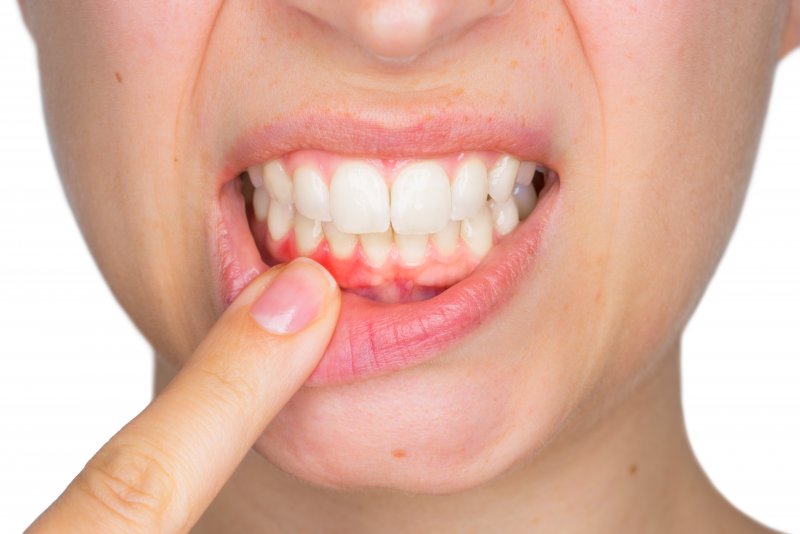Can a Dentist Cure Gum Disease?
September 10, 2020

When gum disease in Waterbury leaves your gums swollen and bleeding, you may wonder if too much damage has occurred to reverse the symptoms. While it is true that depending on the stage you’re in your dentist can stop the spread and help you take back your gum health, many individuals wait too long to seek professional care, resulting in permanent damage and more frequent visits to the dentist’s office. Let a local dental expert explain the stages of gum disease and what you can do to avoid additional harm to your smile.
What Are the Stages of Gum Disease?
To fully understand how periodontal disease (gum disease) can lead to long-lasting, permanent damage, here are the various stages it goes through:
Gingivitis
This is the first stage of gum disease and causes redness, tenderness, and slight bleeding when brushing and/or flossing. You may also develop bad breath (halitosis). If caught during this phase, you and your dentist can reverse the symptoms by practicing good oral hygiene at home and keeping regular cleaning appointments with your dental team.
Early Periodontal Disease
Although not considered reversible, it can be easily managed with periodontal therapy. At this stage, the infection spreads to the bone and begins to cause permanent bone loss. You may also experience similar symptoms as you would with gingivitis; however, these will be more aggressive. To prevent the continued spread of harmful bacteria, your dentist will likely recommend non-surgical treatment methods known as scaling and root planing.
Moderate Periodontal Disease
This third stage of periodontal disease is also non-reversible and is often diagnosed when checking your gum pocket formations. If the depths of these areas are 6-7 millimeters, you can expect more bacteria to accumulate. As a result, your bone will continue to weaken, and the infection and inflammation can enter into your bloodstream, traveling to various areas of your body (i.e. heart, brain, kidneys, lungs). Scaling and root planing will likely be administered in addition to antibiotic therapy to treat the infection.
Severe Periodontal Disease
Once you are in the final stage of gum disease, the infection will spread even deeper, often resulting in 50-90% bone loss. Your soft oral tissues may appear quite red and ooze pus, and your teeth may feel far more sensitive and become loose over time. It is common for individuals in this stage to undergo periodontal surgery, which requires using invasive techniques to clear away the bacteria in your gum pockets. Should you choose to forgo treatment at this stage, you can expect to need complex tooth replacement as well as costly procedures to fix your receding gums and gapped teeth.
Ways to Avoid Gum Disease from the Start
If you want to keep from having to go through scaling and root planing, periodontal surgery, or antibiotic therapy, it’s best if you follow these simple tips from the start:
- Maintain a good oral hygiene routine (i.e. brushing twice daily for two minutes, flossing at least once a day, and rinsing with an antimicrobial mouthwash)
- Keeping your regular dental checkups and cleanings with your dentist twice a year
- Quit smoking or using tobacco products
- Do not drink alcohol excessively
- Avoid using your teeth as tools to open packages and containers
- Eat a well-balanced, nutrient-rich diet
- Wear a mouthguard while playing sports or if you are prone to bruxism (teeth grinding)
While your dentist may be unable to completely cure gum disease, there are ways to prevent it from worsening. If caught early enough, you can continue to enjoy the healthier, happier smile you desire.
About the Authors
Dr. Luciano Marini earned his bachelor’s degree from the University of Connecticut before attaining his dental degree at the University of Connecticut School of Dental Medicine. Dr. Ann Marie Mancini received her doctoral degree from Tufts University School of Dental Medicine. Overseeing Waterbury Smiles, Dr. Marini and Dr. Mancini often see patients with varying degrees of gum disease. As one of the most common dental problems, it is imperative that our team of professionals get ahead of the problem before it worsens. To find out how Dr. Marini or Dr. Mancini can help you, visit our website or call (203) 575-9097.
No Comments
No comments yet.
RSS feed for comments on this post.
Sorry, the comment form is closed at this time.



